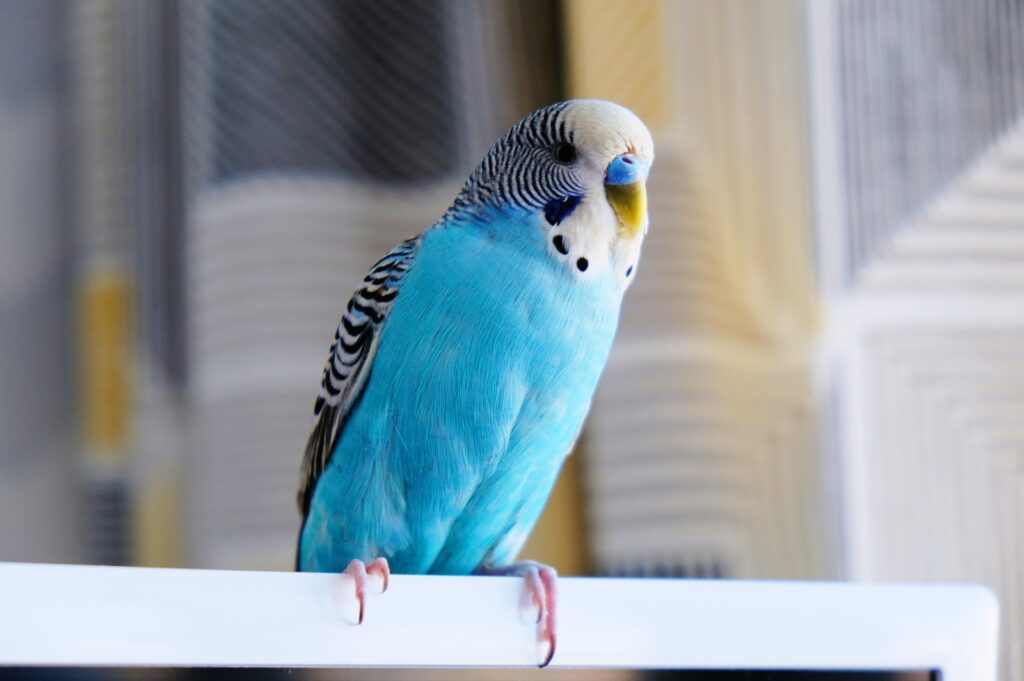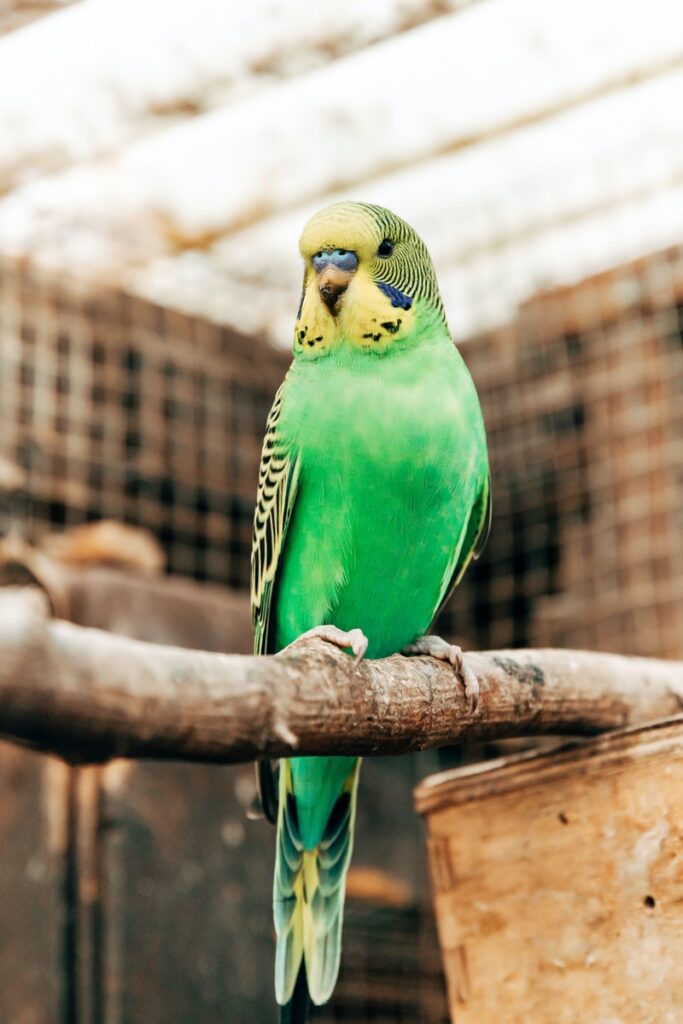Your parakeet should never consume their feces. They are not an animal that can extract nutrition from this, although they may do so for other reasons.
This is a strange and disgusting thing to witness, but your parakeet may attempt to eat their poop.

Why does my parakeet eat his own feces?
Parrots should not consume their own excrement. They are not coprophagic creatures and do not obtain nutrients from excrement naturally. Instead, parrots only engage in this activity when they have no other options for food.
Your parakeet may eat their faeces if their nutrition is deficient, most often because they are just consuming seeds.
Or they might be anxious, expending more calories than usual, and compensating by eating their feces. It’s also possible they’re bored or attempting to clean their cage.
When there are no evident causes or if the parakeet has other health concerns, it is conceivable for them to consume their faeces. You should not let the bird consume their feces.
Let’s take a deeper look at why your parakeet is eating their excrement and what you can do about it.
Is it harmful for parrots to consume poop?
A parrot will not become unwell as a result of eating excrement. Although it is not biologically built to extract as many vitamins as possible from excrement, it can extract a few nutrients. The majority of parrots will consume the faeces with little to no benefit.
When you deworm your parrot, the germs, parasites, or worms that were inside of it will be excreted. These hazardous germs will re-enter the body if you eat its excrement.
Similarly, when parrots consume excrement, they risk consuming pathogens. This is most prevalent when a parrot eats the excrement of a cagemate or another bird with whom they spend time. It may get an illness via the excrement of other parrots, such as psittacosis, which is a common ailment among birds.
What Happens When a Parakeet Eats Its Poop?
Your parakeet eating its own poop should not be a cause for worry in most circumstances. It would be a problem if you had more than one bird in the cage since there is no way to tell if it was his own or the other bird’s excrement. Worse, if he was free-flying and ate the dung of an unfamiliar bird.
Because parasites and germs may be communicated by bird excrement, this could represent a bigger danger. If you are concerned, you should take it to the vet to discuss a suspected parasite infestation or bacterial illness.
Should I let My Parakeet eat poop?
Eating dung is a normal pastime for birds, but it is harmful to parakeets. You should not allow your parrot to consume its excrement. It will only do so if there is a problem with its diet, body, or surroundings.
Instead of letting the bird sort it out on its own, you should figure out what’s causing the problem. Once you’ve resolved the issue, your parrot will be healthier and happier since he won’t be swallowing germs, mold, or parasites.
Reasons Why Your Parakeet Is Eating Its Poop

Coprophagia is the precise word for this activity. Some animals, such as rabbits and dogs, do this as part of their natural cycle.
They receive the most nutrients from their meal by passing it through their stomach twice.
Some birds consume their own excrement on a regular basis, causing you to assume that your parrot is indulging in coprophagia.
In a bird’s digestive system, the caeca is a pair of sacs that link the big and small intestines. However, caeca is not found in all birds. They are found mostly in herbivores and omnivores.
Before you try to encourage the bird to quit eating the excrement, you need first understand what could be causing this behavior in the first place.
This will help you to get to the bottom of the problem and maybe prevent the bird from doing it in the first place. For more information, see our guide on comprehensive parakeet care.
Some of the reasons your bird is behaving this way are as follows:
Deficiencies in Nutrition
Normally, parakeets do not need to consume their feces. They should be able to obtain enough nourishment from the mixture of seed, veggies, calcium blocks, and other dietary items provided to them.
They may believe that eating their excrement is a healthy method to replenish those nutrients.
When compared to other birds, parakeets are more prone to resort to this.
If you suspect that this is the case, it is time to look at the food that you feed your parakeet.
Your bird should be fed a variety of meals rather than just one type.
If you notice your parakeet eating their own eggs, this is another symptom that they are not getting enough nutrients.
A number of malnutrition difficulties can emerge if a pet owner does not provide their parakeet with a wide range of nutritious things, such as confining their parrot to a seed only diet. In order to survive, the parakeet will do things like eat her own faeces.
This means you’ll need to offer them a variety of things, including fruits, vegetables, nuts, pellets, and a variety of seeds.
Seeds aren’t always a bad thing, unless they’re the only thing you feed your parakeet. You must provide them other sorts of food in order to provide them with a well-rounded diet.
If your parakeet is eating their feces because they aren’t getting enough nutrition, then changing their food will help.
When you find that your parakeet is eating the correct food but still eating their own feces, a mineral deficit is more likely to be the cause.
To assist your parakeet, use a cuttlebone and a mineral block. These will provide the bird with additional nourishment.
Nutritional Deficiency Symptoms
Other signs that your bird has a nutritional deficiency may assist you in determining if this is the cause of your bird’s poop-eating. Among these signs are:
- Inadequate feather quality
- Energy deficiency
- Illness prone
- Obesity
- Depression, anxiety, or rage
- Screaming
- Picking feathers
- Impossibility to replicate
- Deficiency, inability to fly
Boredom
You cannot simply leave your parakeets alone with nothing to do. When your parrot becomes bored, it will naturally search for items in its cage to play with or, in this example, eat.
They may also munch on inedible items such as dust, hair, their own feathers, and so on.
Parakeets and other birds are extremely intelligent and require a lot of mental stimulation every day.
If you don’t provide the bird anything to play with or keep them engaged, they’ll turn to foraging to keep themselves entertained.
Foraging inclination
To amusing themselves and satisfy their need to forage on the ground, your parakeet may consume dung off the bottom of the cage. You may prevent this tendency by giving your bird various outlets for his foraging impulses and increasing the enrichment element of his lifestyle.
However, if the parakeet has nothing to eat, they may begin to swallow their own feces. During this period, it is normal for them to consume anything else that is nearby, such as hair and even dust that has gotten into the cage.
This is all harmful to your parakeet and can harm them, therefore it is best to find alternative ways to keep your parakeet entertained.
Foraging toys made of natural materials that parakeets may chew and shred are extremely popular. Try scattering seed or spreading leafy greens or shredded vegetables on a clean piece of newspaper for your tiel to pick through.
Just make sure to remove them as soon as they become dirty and before they deteriorate. Leafy greens or millet spray fastened to the cage’s side might also be used as a foraging source.
Provide a variety of toys to a bored parrot to keep it from eating excrement. Among the best options are:
- Toys that are chewable. Parrots have a natural need to chew on, pull on, and damage objects. Giving your parrot rope, wood, and paper to rip apart will make it less inclined to consume any of the things.
- Toys for foraging These include goodies concealed within them. They not only stimulate your parrot’s brains and allow it to forage, but they also provide it with wonderful food.
- Toys that fit together. These are frequently used as foraging tools. They contain sweets that the parrot must figure out how to get out of the puzzle.
- Toys for physical activities. Swings, ladders, and complicated perches are among the items that encourage your bird to utilize its muscles.
Stress
Another reason why parrots consume their own feces is environmental stress.
If there has been a cage shift, a change of rooms, or they have a hostile cage mate, your parrot will display indications of stress.
Stressed parakeets will consume more nutrients and calories than birds who are calm and collected in their homes. This increased alertness, lack of sleep, and increased heart rate will deplete your bird’s energy supplies faster than ever before.
If the bird is unable to compensate for its lack of energy through food, or if the bird refuses to eat, it may resort to eating dung.
This relates to nutritional insufficiency. When your parakeet is stressed, the chemical makeup of their body changes, resulting in improper absorption of water-soluble nutrients such as vitamin B, vitamin C, and choline. This also occurs when it is moved to a new cage or is exposed to a new environment.
It is a good idea to examine the bird and their surroundings to determine if they are anxious and this is creating some of their eating poop troubles.
You may search for the following signs to see if your parakeet is worried or not:
- They become agitated when dogs, birds, or other humans make quick movements.
- They become agitated when tiny children attempt to handle them.
- They become agitated when other pets harass them.
- They dislike loud noises.
- They are molting a lot.
- They have made significant dietary changes.
- There is a significant shift in their surroundings, such as a new house.
The greatest method to assist your parakeet lessen their stress levels is to remove the source of the stress in the first place. This is not always simple, but take some time to look about the house to see what can help your parakeet feel more at ease.
Dirty cage
Your parakeet will not want to live in an unclean environment. Their house, on the other hand, can soon become filthy due to their droppings, any water or food that spills, and the toys that are kept about.
When the parakeet finds the environment excessively unclean, it may attempt to flick the dried excrement out of the cage. When the situation becomes critical, they may decide to consume the fresh dung in order to maintain the area clean.
The parakeet is wise enough to realize that the new excrement is only adding to the clutter. To assist in keeping things clean, they may chose to toss out or consume the faeces.
If you observe this happening, it is your responsibility to clean the cage more frequently. Leaving the cage in such manner will just exacerbate the problem.
Every day, at the very least, you should clean the cage. This will assist to clear up a lot of the debris and keep your bird’s environment neat.
You should consider completing a deep clean of the entire cage once a week or once a month, depending on how much of a mess is produced in the cage.
This involves replacing the liners, cleaning out the water and food bowls, and sweeping or vacuuming the cage.
If this is the primary reason your parakeet is eating their own excrement, cleaning up the cage should be sufficient to convince them to stop.
To avoid them from eating their own excrement in the future, try to keep up with all of the cleaning on a regular basis, doing a little bit each day and a thorough clean at the end of the week.
Health Concerns
It should cease once you’ve tried all of the other methods for getting your parakeet to quit eating their excrement. If you discover that all other concerns have been checked out and they continue to do this, the parakeet may have a health condition.
If your parakeet is sick or has a condition, he or she may feel driven to consume their poop.
When this occurs, it is necessary to take the parrot to the veterinarian for an examination.
A expert will be able to examine the parakeet and determine the underlying problem of why your bird is eating their own waste. They may also have some further suggestions on how to stop this behavior and keep the bird healthy and happy.
How Do You Stop Your Parakeet From Eating Their Own Poop?
Here are a few methods for preventing your parakeet from eating its own poop:
- Clean the cage: To break this behavior, make sure your parrot’s cage is cleaned every day. For a week or two, clean the cage every time your parrot poops until it unlearns this tendency.
- Make use of a different cage: It is preferable to use a cage with a metal floor grate and a tray that is low enough that the bird cannot reach any poop.
- By addressing the root cause: Once you understand why your parrot is eating its excrement, you’ll be able to address the underlying issue and assist your bird in breaking this habit!
- Opportunities for foraging: If your bird is eating its feces for enjoyment or boredom, the easiest approach to deal with it is to offer it something else to bite, crunch, and play with. Shredding toys made of paper, wicker, cardboard, and other natural materials is a favorite pastime of many parakeets. To give your bird something tasty to work for, put goodies into foraging toys.

jay
I am not an expert, just passionate. I own a Parakeet and I have been in your shoes. If you are currently looking for information, I've done the research and that is the reason why I created this website.
